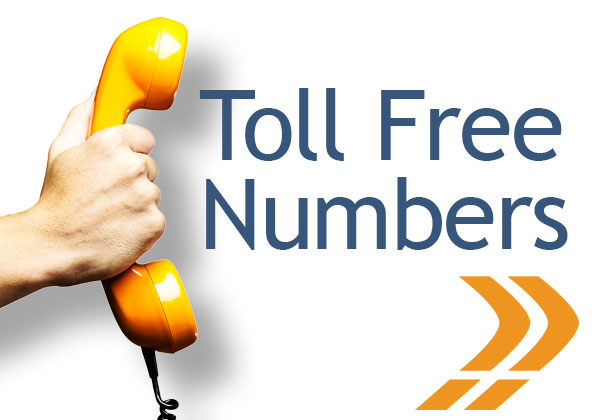
Introduction
In today’s competitive business landscape, small businesses are constantly seeking ways to stand out and attract customers. One such tool that has gained popularity is the toll-free number. The toll-free number service provider offers a range of features and options to meet the communication needs of small businesses.
What are Toll-Free Numbers?
Toll-free numbers are telephone numbers with distinct three-digit codes (such as 800, 888, 877, etc.) that allow callers to reach a business without incurring any charges for the call. Instead, the business that owns the toll-free number bears the cost of the call, making it convenient and cost-effective for customers to contact them.
Benefits of Toll-Free Numbers for Small Businesses
Toll-Free Numbers for Small Businesses: Cost-Effectiveness
One of the primary advantages of toll-free numbers for small businesses is their cost-effectiveness. By offering a toll-free number, businesses eliminate the barrier of long-distance charges, encouraging potential customers from across the country or even internationally to reach out without hesitation.
Moreover, toll-free numbers contribute to enhanced credibility for small businesses. A toll-free number conveys a professional image and suggests that the business is established and customer-oriented, thereby instilling trust and confidence in potential customers.
Furthermore, toll-free numbers facilitate improved customer service. Customers appreciate the convenience of being able to reach a business easily and at no cost. This accessibility enhances customer satisfaction and loyalty, ultimately leading to repeat business and positive word-of-mouth referrals.
Challenges of Toll-Free Numbers for Small Businesses
Despite their numerous benefits, toll-free numbers come with certain challenges, particularly for small businesses.
Initial Setup Costs
One of the primary challenges is the initial setup costs associated with acquiring a toll-free number. Small businesses operating on a tight budget may find it daunting to invest in a toll-free number, especially if they are uncertain about the potential return on investment.
Call Volume Management
Another challenge is managing the call volume generated by a toll-free number. Small businesses may lack the resources or infrastructure to handle a high volume of incoming calls effectively, leading to long wait times or inadequate customer support, which can negatively impact customer satisfaction.
Geographic Limitations
Additionally, toll-free numbers may have geographic limitations, as they are typically associated with specific regions or countries. This limitation can hinder small businesses with international customers or those seeking to expand their reach beyond their local area.
Factors to Consider Before Getting a Toll-Free Number
Before investing in a toll-free number, small businesses should carefully consider several factors to ensure that it aligns with their goals and requirements.
Budget Allocation
First and foremost, businesses should assess their budget and determine whether allocating funds to a toll-free number is feasible and beneficial in the long run. Calculating the potential return on investment and weighing it against the initial setup and ongoing costs is crucial in making an informed decision.
Business Goals and Customer Base
Businesses should also evaluate their goals and target customer base. A toll-free number may be more suitable for businesses with a national or international clientele or those aiming to establish a professional and credible image.
Call Management System
Furthermore, small businesses need to have a robust call management system in place to handle incoming calls efficiently. This includes implementing call forwarding, voicemail, and automated greetings to ensure that every caller receives prompt and satisfactory assistance.
Tips for Choosing the Right Toll-Free Number Provider
When selecting a toll-free number provider, small businesses should consider several factors to ensure that they choose the most suitable option for their needs.
Pricing Plans
It’s essential to compare pricing plans offered by different providers and choose one that offers competitive rates without compromising on quality or features. Businesses should consider factors such as monthly fees, per-minute charges, and any additional costs for advanced features or customization.
Features and Customization Options
Additionally, businesses should assess the features and customization options offered by toll-free number providers. These may include call forwarding, voicemail-to-email transcription, virtual receptionist services, and personalized greetings. Choosing a provider that offers a range of features can enhance the overall customer experience and streamline communication processes.
Customer Support
Lastly, small businesses should prioritize providers that offer reliable customer support and technical assistance. In the event of any issues or concerns, having access to knowledgeable and responsive support staff can make a significant difference in resolving problems quickly and minimizing downtime.
Alternatives to Toll-Free Numbers for Small Businesses
While toll-free numbers offer several advantages, they may not be the ideal solution for every small business. Fortunately, there are alternative options worth considering.
Local Phone Numbers
Small businesses can opt for local phone numbers with area codes that align with their target market or location. Local numbers can convey a sense of community and familiarity, making them appealing to customers in specific regions.
Virtual Phone Systems
Virtual phone systems offer small businesses a flexible and cost-effective communication solution. These systems typically include features such as call forwarding, voicemail, and virtual receptionists, allowing businesses to manage calls efficiently without the need for a dedicated phone line.
Conclusion
In conclusion, toll-free numbers can be a valuable asset for small businesses looking to enhance their communication capabilities, improve customer service, and establish a professional image. While they come with certain challenges and considerations, the benefits they offer in terms of cost-effectiveness, credibility, and accessibility make them a worthwhile investment for many small enterprises.
About Us:
“Space Edge Technology” appears to be a term that might refer to a company, concept, or technology related to space exploration or utilization. However, without further context, it’s challenging to provide specific information.





